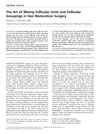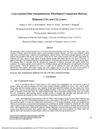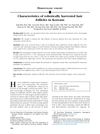 22 citations,
December 2013 in “Molecular biology of the cell”
22 citations,
December 2013 in “Molecular biology of the cell” ILK is essential for proper hair follicle development and structure.
 19 citations,
August 2012 in “Cell death and differentiation”
19 citations,
August 2012 in “Cell death and differentiation” Intu gene is crucial for hair follicle formation by helping keratinocytes differentiate through primary cilia.
[object Object]  16 citations,
February 2019 in “Gene”
16 citations,
February 2019 in “Gene” Researchers found a good way to isolate hair follicle stem cells from newborn goats for further study.
 7 citations,
June 2004 in “Dermatologic Surgery”
7 citations,
June 2004 in “Dermatologic Surgery” A new hair transplant method combines individual and group follicles for better results and efficiency.
 4 citations,
March 2017 in “Development”
4 citations,
March 2017 in “Development” Estrogen is important for keeping adult mouse nipple skin healthy by controlling certain cell signals.
 2 citations,
February 2024 in “Nature cell biology”
2 citations,
February 2024 in “Nature cell biology” Mechanical forces are crucial for shaping cells and forming tissues during development.

Hair transplants are effective for male and female pattern baldness, have evolved in technique, and require careful planning for natural results and managing complications.
 January 2016 in “Elsevier eBooks”
January 2016 in “Elsevier eBooks” Trichoscopy is a key method for dermatologists to quickly and effectively diagnose hair and scalp conditions.
 June 1999 in “Proceedings of SPIE”
June 1999 in “Proceedings of SPIE” The CO₂ laser is better for hair transplantation because it causes less damage than the Ho:YAG laser.
 July 1998 in “Dermatologic Surgery”
July 1998 in “Dermatologic Surgery” Various techniques and tools for hair restoration were presented in 1998, including a mathematical model for donor area, use of lasers in surgery, methods for controlling grafted hair direction, and ways to increase graft yield. Satisfaction rates were around 39%, and studies showed trauma and dehydration can damage hair follicles.
 305 citations,
June 2012 in “Nature”
305 citations,
June 2012 in “Nature” Hair regeneration needs dynamic cell behavior and mesenchyme presence for stem cell activation.
 248 citations,
November 2011 in “The EMBO Journal”
248 citations,
November 2011 in “The EMBO Journal” Wnt1/βcatenin signaling is crucial for heart repair after injury.
 184 citations,
November 2014 in “Developmental Cell”
184 citations,
November 2014 in “Developmental Cell” Hair follicle dermal stem cells are key for regenerating parts of the hair follicle and determining hair type.
 21 citations,
October 2009 in “Biochemical Engineering Journal”
21 citations,
October 2009 in “Biochemical Engineering Journal” Stem cell therapy is a promising approach for hair regrowth despite potential side effects.
 14 citations,
February 2021 in “Experimental Dermatology”
14 citations,
February 2021 in “Experimental Dermatology” Cannabinoid receptor-1 signaling is essential for the survival and growth of human hair follicle stem cells.
 12 citations,
June 2020 in “Frontiers in Cell and Developmental Biology”
12 citations,
June 2020 in “Frontiers in Cell and Developmental Biology” The PP2A-B55α protein is essential for brain and skin development in embryos.
 2 citations,
December 2020 in “bioRxiv (Cold Spring Harbor Laboratory)”
2 citations,
December 2020 in “bioRxiv (Cold Spring Harbor Laboratory)” The SYP123-VAMP727 complex is important for transporting materials that harden the root hair shank in Arabidopsis.

No single biomarker is reliable enough for diagnosing and assessing SLE.
[object Object]  321 citations,
March 2015 in “Nature”
321 citations,
March 2015 in “Nature” Super-enhancers controlled by pioneer factors like SOX9 are crucial for stem cell adaptability and identity.
 130 citations,
August 2015 in “Experimental Dermatology”
130 citations,
August 2015 in “Experimental Dermatology” Human hair follicle organ culture is a useful model for hair research with potential for studying hair biology and testing treatments.
 24 citations,
April 2012 in “Developmental Biology”
24 citations,
April 2012 in “Developmental Biology” Dermal papillae cells, important for hair growth, come from multiple cell lines and can be formed by skin cells, regardless of their origin or hair cycle phase. These cells rarely divide, but their ability to shape tissue may contribute to their efficiency in inducing hair growth.
 17 citations,
March 2012 in “The Journal of Pathology”
17 citations,
March 2012 in “The Journal of Pathology” In vivo lineage labelling is better than in vitro methods for identifying and understanding stem cells.
 8 citations,
October 2018 in “Applied sciences”
8 citations,
October 2018 in “Applied sciences” Alginate spheres help maintain hair growth potential in human cells for hair loss treatment.
 1 citations,
December 1999 in “Dermatologic Surgery”
1 citations,
December 1999 in “Dermatologic Surgery” Propofol-ketamine and propofol-fentanyl are effective and safe for cosmetic surgery sedation.

PlacMA hydrogels from human placenta are versatile and useful for cell culture and tissue engineering.
 42 citations,
February 2017 in “Scientific Reports”
42 citations,
February 2017 in “Scientific Reports” Researchers found a way to create cells from stem cells that act like human cells important for hair growth and could be used for hair regeneration treatments.
 37 citations,
March 2006 in “Regulatory Peptides”
37 citations,
March 2006 in “Regulatory Peptides” Mice skin has components that could help with hair growth and might be used for diabetes treatment.
 29 citations,
January 2010 in “Methods in Enzymology”
29 citations,
January 2010 in “Methods in Enzymology” The document concludes that careful design of genetic fate mapping experiments is crucial for accurate cell lineage tracing in mice.
 23 citations,
September 2014 in “Journal of The American Academy of Dermatology”
23 citations,
September 2014 in “Journal of The American Academy of Dermatology” The robotic hair restoration device had a high success rate and was faster than manual methods for Korean patients.
 15 citations,
December 2007 in “Dermatologic Therapy”
15 citations,
December 2007 in “Dermatologic Therapy” Hair transplantation has improved with techniques that increase graft survival and patient satisfaction for more natural results.






























